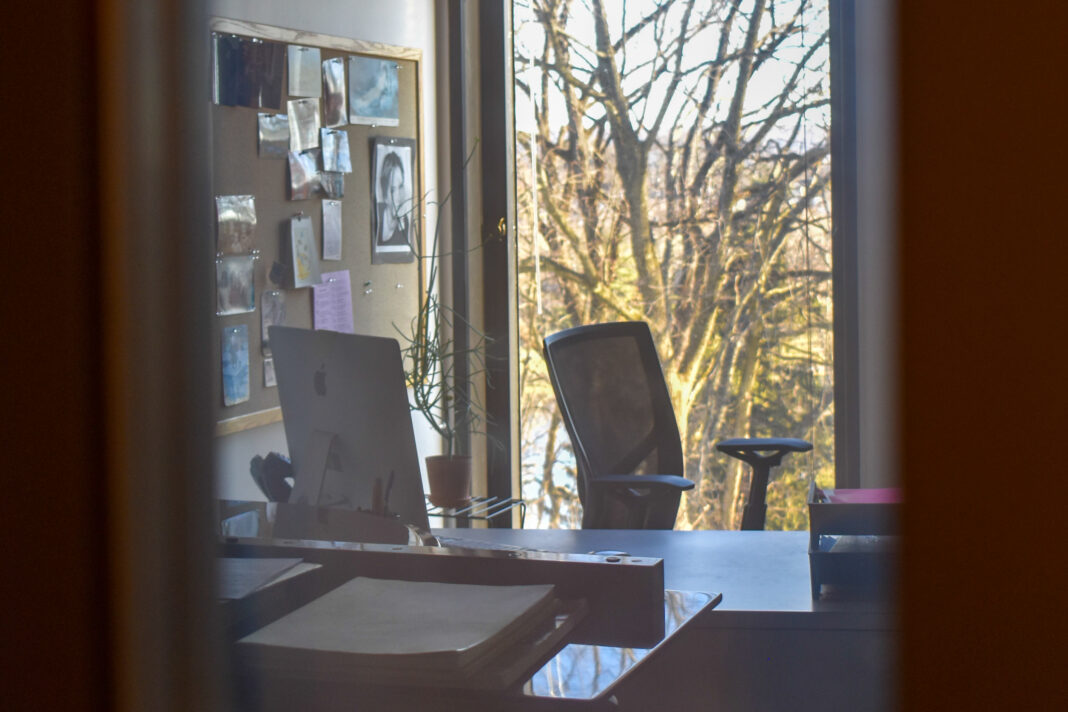Office spaces across campus do not tell the full story. While it may appear that some staff members are absent from their desk, they might be partaking in their work remotely or traveling for the College. The standard 9-5 work week is not a standard practice here at Muhlenberg.
“In my role as the Vice President for Advancement, no two days or weeks look the same,” said Rebekkah Brown ‘99, who is also an adjunct professor of dance.
“A ‘typical’ week is Monday-Friday, 8:30 a.m. to 5 p.m. I would say that *most* weeks (as in, somewhat more than 50 percent of the weeks) are typical, but it’s also very common to have ‘atypical weeks,’” stated Associate Director of Alumni Affairs Tara Simpson ‘02.
Theatre & Dance Marketing & Development Manager Scott Snyder stated, “I’m usually in the office more or less 9:00 to 5:30 or 6:00, and then I’ll go home and spend some time with my family, but then I’ll get my laptop out and pick back up in the evening and on the weekend, like right now.”
“I’m hard-pressed to describe a ‘typical work week’ as the work in the department is dynamic and no two weeks are alike. On weeks when I don’t have to be present at tech rehearsals or meetings, my hours are usually 7:45 a.m. to 6:00 p.m.,” stated Director of Operations and Production for the Department of Theatre & Dance and Adjunct Professor Jessica Bien.
Director of Career Coaching & Education Caitlin Bach said, “The Career Center and its staff do follow the traditional 9-5 working hours, but we definitely fit in a lot during those hours.”
“I would say for the majority of the year, we follow an 8:30 a.m. to 5:00 p.m. schedule, with occasional additional work in the evenings or on Saturdays depending on visit programming for prospective students and their families. However, we have a travel season in the fall, and a smaller travel season in the Spring, both of which do not follow such a straightforward schedule,” stated Admissions Counselor Emily Kapelsohn.
BROWN continued, “This position requires me to be in many meetings on campus with members of the community (faculty, staff and students), and I also travel frequently to meet with alumni, parents and friends of the College who are engaging with and making philanthropic gifts to the College.”
“For example, during one week this fall, I was on campus on Monday, Tuesday and Wednesday for a variety of meetings and teaching Tap II on Monday and Wednesday,” Brown stated as she is also an adjunct professor of dance. “I headed to the airport right after class on Wednesday to fly to North Carolina and spent the rest of the week traveling throughout North and South Carolina with President Harring to meet with alumni and donors to the College, soliciting gifts for the Boundless campaign, while taking virtual meetings with people back on campus as well.”
To accommodate for teaching tap two, Brown has to utilize her time usually set for a lunch break on Mondays and Wednesdays from 12:30-1:50 p.m. “The dance department is gracious enough to work with my schedule so I’m not missing critical meeting times in my VP for Advancement role. The times and days for teaching aren’t always the same each semester, but I usually teach 2 days a week over lunchtime which means my responsibilities as the VP for Advancement can be fully met.”
SIMPSON shared, “The average number of hours I’ve worked during [the week leading up to alumni weekend] is 88. This is ‘just part of the job’ for Alumni Weekend, and it’s normal for that week to be preceded by more weeks of longer-than-normal hours, but that’s the only time of year that we work such extreme hours. You basically just know that you’re going to be working constantly for a while, you clear your calendar and say goodbye to your friends and family until it’s over. But there are always lots of snacks!”
The office space at Muhlenberg is also nontraditional because of the opportunity to work remotely, a lingering result of the pandemic. Brown works remotely one to two days of the week, and Simpson’s entire work week is flexible beyond any concrete commitments. “If we need to go to a personal appointment, run an errand, have a family obligation, etc., we can generally make adjustments to accommodate for that. If there’s snow or ice, we can work at home. I value this flexibility very strongly and it’s one of the things I most appreciate about working for Muhlenberg…You really need to plan ahead and block your calendar and be prepared to work around those commitments.”
SNYDER may not work in the office during the traditional office hours, but he is always available online.
“All together, I’ll typically put in 50 or 60 hours a week — less during down time, like December and June, more when it’s crunch time and there’s a lot going on, or I’ve got a deadline.”
Snyder does not necessarily have strict remote days, but he does have flexible opportunities to be remote if he is sick or his schedule allows for it.
“My schedule follows the production calendar to some extent of course — playbills go to press and ads run and photo calls happen according to the show schedule. But my work is more spread out, and we’re often working pretty far ahead — that’s certainly the goal. I don’t have the same crunch time that other members of the production staff have, where you’ve got access to a performance space for, like, three days, and you’ve got to get all the work done in those three days.”
BIEN, self-described as “the hub of the big department wheel,” is also an adjunct professor to teach accessibility in the arts and stage management courses in addition to her production title.
“Two weeks or so out of every month (though for February it’s three weeks), we’ll have a department show ‘in tech.’ This is when all of the technical elements (the set, lights, sound, costumes, etc.) are added to the production and we rehearse onstage…During tech and dress rehearsals, I typically work 7:45 a.m. – 3:00 p.m. and then 6:30 p.m.- 11:30 p.m. weekdays and then there’s usually a Saturday rehearsal from 11:30 a.m. – 6:30 p.m.,” Bien continued. “I try really hard to preserve (at least) Sunday off from all tech and dress rehearsals for everyone involved…There’s no one else in the department that manages or mentors the things that I do, and all the rest of the staff are managing their own large workloads and priorities. To be honest, I teach my students about the importance of boundaries in their work, but I often struggle to maintain them myself.”
BACH, who was promoted this past fall to Director of Career Coaching & Education, engages with students across campus in various areas with different workshops, appointments and other activities. “There is definitely no such thing as a ‘Normal Week’ in the Career Center, but I think that’s what I love so much about being there! In any given week, I could be meeting with students individually, presenting in different classes, meeting with other campus offices & faculty or planning & implementing different events or trips off campus.”
Bach has the option to work remote one day a week, though this does come with some challenges since Bach mainly focuses on workshops that require interaction with students. “It can be difficult in my role to be remote as so much of my work is visiting classes, hosting workshops, taking trips, meeting with students and running activities. I am very fortunate that I have the opportunity to do that. Other positions might allow for more remote time, but I am in this role because I like engaging with all the different people across campus, so I enjoy having just one day to be remote.”
KAPELSOHN also oversees the tour guide program in addition to her counselor position and might not be regularly found sitting at her desk in her office. “My schedule while recruiting for the College during travel season is not quite as predictable, as there is a lot of variability. I would say that most commonly, from September through the start of November, my schedule consists of three to five high school visits during the day, catching up on work and performing virtual interviews during the late afternoon, and then a college fair most evenings. My travel territory is Northern New Jersey, so this can also consist of staying in the territory during the week if needed.”
Kapelsohn has no remote possibilities, as her job is spent engaging with prospective students and families while also managing the student employees who make up the tour guide program. “Admissions is an extremely cyclical field; the day-to-day work varies throughout the year but always follows the same pattern. This impacts the ‘typical’ work week a good bit.”
All of these positions operate with different schedules, highlighting how the work week looks different for everyone. Flexible work hours and schedules may seem to break the mold, but to what extent?
Brown concluded, “It isn’t easy to manage and fulfill the expectations of each of these roles, and I hold myself to very high standards of success, but thoughtful planning, strong commitment and the ability to be nimble allows me to do them both successfully, and it ultimately makes me more effective in each of these roles.”
Johnny '24 is a Theatre and Media and Communication double major at 'Berg. He loves to highlight the voices of artists across campus and to showcase the wide variety of events at Muhlenberg. He likes to think he is funny, but that is up for debate.























